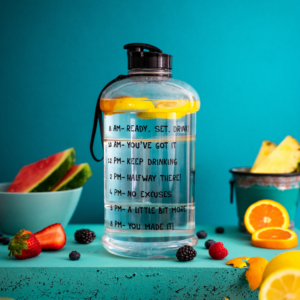The ONE Simple Health Habit You Need For 2022
I’ve seen a lot of complex cases over the years. While it can be perplexing figuring out where to start, I am still astounded how sometimes the simple solutions can have a dramatic impact on health. One of these powerful and simple solutions is hydration.
We all know that our bodies are part water. The amount varies depending on where in the body we’re looking at. Our bones are only 31% water, whereas the muscle and kidneys are more than two times that, at 79% water.
Even though we know water is an important part of our body chemistry, not getting enough is one of the most common issues I see in my practice. People are just not drinking enough of it.
I include myself in that number as well as I’ve always struggled with drinking water. But before we talk about ways to stay adequately hydrated, let’s talk about some benefits of proper hydration.
Feeling tired or having trouble concentrating? That may be due to dehydration. Even mild dehydration, losing just 1-2% of your body weight from lack of water, can cause some troubling symptoms.
In addition to difficulty concentrating and fatigue, mild dehydration is also associated with headaches, dizziness or lightheadedness, muscle weakness, mood changes, and dry skin.
Staying properly hydrated is important for almost every system in your body. It can impact blood pressure and digestion, in particular it can alleviate constipation. Drinking adequate amounts of water also helps to regulate your body temperature and protects your tissues and joints.
Hydration can even affect hormone balance since hormones travel through blood, which is composed mostly of water. I’ve also seen improvement in hydration helping with bloating and edema (swelling).
With all these amazing benefits, you may not be surprised to learn that this is usually one of the first things I address with my patients, no matter what the issue. So if you’re not drinking about half your body weight in ounces daily, increasing your water intake would be a good place to start.
I find people usually fall into two main groups for why they’re not getting enough water: they forget to drink it or they don’t like the taste.
For those of us that forget to drink water (myself included), there are a few easy solutions that can have a big impact.
If you want to keep it simple, try getting a larger bottle or glass. It can be hard to keep count of how many eight ounce glasses you’ve had day in and day out so having a larger bottle or glass helps.

Personally, I use a 24 oz mason jar as my water cup, both at home and in the office. I know I need to drink about three a day, which makes it much easier to keep track of than several smaller glasses. I try to drink one by noon, a second by 4pm, and my last by 8pm. To make it even simpler, they also have large water bottles that have the time written on the side so no math needed!
Another option if you forget to drink water is to use technology. There are apps you can download to your phone that help remind you to drink water. You determine how frequently you’d like to be reminded and you can even track how much you’re drinking. Some devices, like the Fitbit, already have this feature included.
On the other hand, if you have no problem remembering to drink water but just hate the taste, it’s ok to doctor it up. While I generally recommend drinking plain water, you can easily add a few pieces of fruit, herbs like mint or lemon balm, or vegetables like cucumber, to give it some flavor. I love some of the combinations on this site.
And while I don’t think coffee or black tea should count towards your water consumption since caffeine is a diuretic, most herbal teas are ok so feel free to mix it up and alternate water and herbal tea.
If you’ve been chronically dehydrated for some time and tend to average on the lower end of ounces per day, start small and focus on consistency. This gives your kidneys and bladder time to adjust to the change in fluid in your body so you’re not running to the bathroom every hour.
For example, if your average is 10-20 ounces a day, start by trying to get 20 oz a day consistently. Then work on gradually increasing how much water you’re drinking, a little at a time, until you reach your goal.
It’s easy to be caught up in the hype of the latest supplement, superfood, or diet you hear about but don’t overlook the simple daily habits that can make a big difference for chronic health concerns.
 Next Post
Next Post

